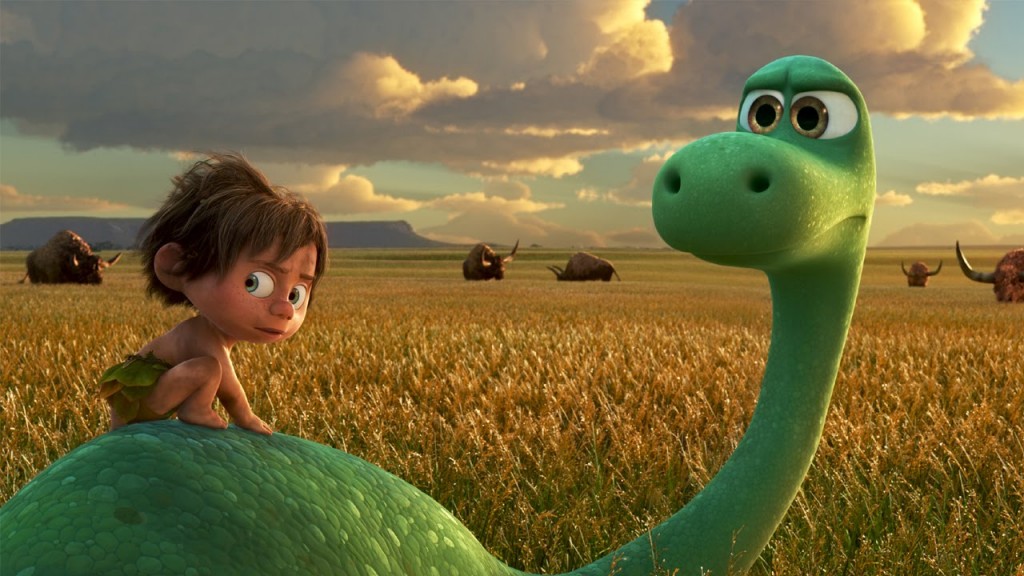A Merely Good Dinosaur, by Reed Lackey
25 Nov
There’s a somewhat unfair quality that most audience members have when they see a film produced by a proven creative team. When a studio’s filmography includes entries which thrive on originality, subverting viewer expectations, and breaking through generational boundaries, films which are merely competent are often treated poorly by comparison. The Good Dinosaur, the latest entry in the canon from Pixar Animation Studios, suffers by being merely a good movie rather than a great one.
Relying on narrative tropes and settings which evoke American westerns, The Good Dinosaur tells the story of Arlo, a timid and skittish young Apatosaurus who struggles to cope with his own fear of the world around him. When an unexpected tragedy strikes Arlo’s family, followed by an impulsive decision by Arlo himself, Arlo finds himself on his own in the midst of an unknown wilderness, struggling to find his way home. His only companion is Spot, an adolescent caveman who behaves almost exclusively like a dog and was originally an impetus of both the agitation and the tragedy which struck Arlo’s home. Together, the two of them establish a bond of necessity and affection as they journey through the uncharted territory.
Where the film excels is in its visual style. Once again, Pixar has elevated the bar for digital imagery and they manage with this latest film to almost eliminate the proverbial “uncanny valley” entirely. There were scenes of mountains, fields, trees, and rivers which I found myself wondering if they hadn’t layered animated characters onto actual filmed reality. It’s simply a breathtaking and beautiful visual feast.
Unfortunately, this time around, the only truly impressive component of the film is its visual style. This is not to say that the film’s narrative, characters, and thematic depth are poor. But again, when the pedigree standard is at the level where Pixar has placed it, ordinary and competent filmmaking feels inferior. The film also suffers from what I refer to as “assumed empathy” where character and thematic beats are not substantiated by the events of the narrative. Arlo’s journey is one of overcoming fear, but the emotional landmarks for growth don’t emerge organically. Arlo overcomes his fear, not because the circumstances have shown him how to, but because there would be no way to progress the story if he didn’t. In the opportunities where the film might capitalize on character histories or situational challenges, it far too often takes the path of least resistance narratively.
Perhaps this stifling of potential is due to the almost paint-by-numbers way the narrative imitates classic American westerns. In the first act, the sense of the farm and the wild west feel more evocative, but it becomes almost ludicrous as the narrative progresses, complete with a T-Rex family which are inexplicably herders for a large group of longhorn cattle. The film sometimes depends too much on the tropes of the western to its own narrative detriment, stumbling into predictability and a compartmentalization of its theme. By attempting to evoke a familiar narrative rhythm, they often wind up telling one that is a bit too familiar to be inspiring. This is particularly true of the tragedy which propels the film into its second act. The sad event feels forced and obvious and therefore emotionally hollow, not to mention that it is accidentally made largely irrelevant in the film’s third act when an almost identical event happens to weaker characters who somehow manage to emerge virtually unscathed.
I’ve been harsh on The Good Dinosaur, which speaks somewhat to the lack of fairness I mentioned earlier. Because the film is a visual masterpiece, with moments of genuine emotional resonance and a fair share of good humor as well. Sadly those qualities feel isolated and buried within a story which feels underdeveloped and predictable. For all of the qualities which make The Good Dinosaur entertaining and undeniably charming, there are as many or more qualities which hinder it from greatness and don’t allow it rise above the adjective in its title.




No comments yet